#while most of her arc + character development has to do with her interpersonal relationships
Explore tagged Tumblr posts
Text
wednesday is not a good show, unfortunately i am so compelled by what miss jenna ortega is doing here that i’m rewatching it. skipping through all the boring scenes though
#also like. even though the writing generally is not good wednesday herself is actually quite a well-written well-adapted character#like they have a lot of clarity and consistency in her motivations and how she functions in the world#which i think is a real challenge with a character who doesn’t feel things in the same way other people do#while most of her arc + character development has to do with her interpersonal relationships#like how do you make this girl friends with pretty much normal people + make it feel organic lol#i think they did a pretty good job at that#anyway#i just want to see girls be freaky little weirdos forever
17 notes
·
View notes
Text
back in my headcanon posting arc (EVERYONE THROWS TOMATOES AT ME)
hitting daya w my ASPD beam I never see people bring the disorder up in good faith and I'm SICK of it I am SICK AND I AM TIRED
ANOTHER wall of text post it wasn't meant to be this long I don't know what happened
DAYA MY SPECIALEST FAVORITEST CHARACTER WHO MAKES ME SO SAAADDD
before leaving her community she had zero agency. like NONE. at all. every beat of her life was already mapped out before she had any sort of say in it, and that presumably just kept happening and happening and happening until she reached a point where she just could not take that anymore
what little we get from her lore implies that she was valued more for what she did or what she could provide than who she was on her own. and one: the idea that relationships are an inherently transactional thing is going to be there in your head when it's been demonstrated to you your entire life
two: a relationship like that with the community that raises you, from Your Family, is going to mess you up! a lot!!! and environmental factors have been cited to contribute to ASPD developing, especially an inability to rely on your caretakers or the authority figures in your life to protect you
because it wasn't another person that got her out of that situation. daya saved HERSELF. which absolutely would solidify those beliefs further; that close relationships are means to meet a goal. and are not inherently safe. "all these people around me while this was going on and I am the only one that did something"
and that! is only going to get worse the longer you go without a real support system! especially if you are the person that gets out of there without help. when you're surrounded by people that endlessly fail you then you aren't going to have trust in people, right. that inability to trust people and loss of control is a huge huge deal with this disorder forming
social "support" system fails you over and over and over → one way of coping with that is abandoning prosocial ideas outright. I don't think this is 1:1 what happens and aspd is so little researched but I HAVE read pwASPD clarify that their experiences with unstable support systems while younger contributed heavily to having antisocial traits as an adult

the view of relationships being transactional is also something that might go under the radar while she's doing dungeon work or while she's in a party because an approach like that (no heavy interpersonal relationships, business is business) is a beneficial one to have. when you view your work and your colleagues from that lens you are less likely to split up from your party in possibly dire moments. you are less likely to die down there
she also (reasonably) doesn't ever show guilt or remorse for leaving, She Just Does. daya has no reason to feel bad, so why should she? what reason does she have to get upset? a reasonable response even if she DIDN'T have ASPD (considering how those people treated her) but her having it would add a layer to that
and also her detachment emotionally, like because of her upbringing. and she IS a more detached person in contrast to the more expressive people in her party, like mickbell. there IS a flatter expression with her, daya comes across as calmer and less involved emotionally than a lot of the people she surrounds herself with
so like of course she's never considered that something might be "wrong" there. the setting doesn't prompt questions like that. neither did her upbringing. this is just all that daya's ever known
(and that's probably why she gets along so well with holm? in particular? he doesn't really demand stuff out of people or emote very strongly, he's There but not Overwhelmingly There if that makes sense. and that attitude would probably feel refreshing for someone who might be easily drained during social situations. ASPD DID solidarity I love it here)
it very well could be because daya doesn't have a lot of screen time (most side characters don't so I Get It) but we really don't see her expressing any feelings very strongly? the most that comes to mind is the initial fight with chimera falin where she Actually Fucking Dies
we don't get a lot to work with for her and part of that is why this post is all over the place. the other part is this has been sitting in my drafts for like a month and I can't remember what else I wanted to add. but like FROM WHAT I SEE HERE I think it would make SO much sense for daya to experience things like emotional blunting
"dying" to the treasure insects and losing her necklace? she's upset but not for long at all, and not about losing the treasure, just her necklace. watching kabru later on kill those corpse retrievers she's all like "yayyy I love when people do the right thing ❤️❤️❤️❤️" (which I laugh every time about. because it's fucking hilarious) but the response still reads as like. not enthusiastic or anything, maybe like, relieved, at most (which either way doesn't feel "right" for the situation)
we don't see her sad, we see her disappointed for a little bit and then she gets over it. I don't remember ever seeing her be overly excited, just at the part where they found the treasure bugs that they still thought were treasure, and even then she was reacting with the group. it is very very easily to blend in with a group. outside of that I mostly remember her being content, maybe, but not enthusiastic about anything
the strongest emotions we get to see from daya are anger/annoyance and fear. and half the time (chimera falin fight, her attacking her party thinking they're mermen) it looks to be both at the same time. lashing out that stems from fear. panic, then fight response. the situations in which she is not calm unfold the way they do because she is in some kind of danger.
detachment comes from distrust, and distrust stems from fear of being hurt. hypervigilance will do that to you, which a lot of pwASPD also will tell you they have. I think daya may feel things like excitement or sadness on a much lower threshold most or all of the time, where fear is not blunted because self reliance in her case could also be self preservation. and the need to defend herself at all times never went away
her fiance could be her exception also. do you see my vision
i just think it'd be like. interesting yk. I myself do NOT have ASPD (or any personality disorder I want to make that clear) but I know people who do. and a lot of characters that people say Must Surely Have It are normally antagonistic or the Worst People You Will Ever Meet and that's AWFUL. COMBATING that. YAY (THE BAR IS ON THE FLOOR PLEASE GUYS PLEASE)
reading firsthand accounts about what it's actually like having it (emotional blunting, a want for convenience, detachment from most or all other people, overreliance on the self, the environmental factors that contribute) did remind me of daya, A Lot. and I think also seeing more sympathetic portrayals of characters ESPECIALLY women that aren't lively and social and sentimental would be nice
pd headcanons are AWESOME i CHEER SO LOUDLY every time I see them but I don't really notice like ... any ASPD ones. especially not for women. which has me confused and pondering my orb because daya is RIGHT THERE. I love her and this is something you cannot convince me otherwise about actually
I'm not proofreading this again if there's a billion typos it'll be alright. surely
#dungeon meshi#dunmeshi#dunmeshi headcanons#diamond of sadena#“the author didn't intend for --” I DONT CAAAAARE THOG NOT CARE. WHO CAREE
14 notes
·
View notes
Text
Ok this is my first real post in a while, and I just wanna talk about my thoughts on the finalist poll that was a month ago now. Btw, FINAL EPISODE TODAY, HOW WE FEELING??
I was super surprised cause I thought Suitcase would be soloing, but she wasn’t. I looked through the comments to see everyone’s opinions, and these were my thoughts at the time.
Everyone who supports suitcase is saying like “oh yeah she deserves to win because she’s been through so much” but like, while I love suitcase and want her to win, I don’t think that’s the point. Her whole thing in the last episode was that she didn’t want people’s opinions of her to change when they discovered she had been experiencing hallucinations. She’s capable outside of her disability, and that’s why I want her to win. Cause she wants to prove herself. It makes total sense for her character arc for her to win. And cause she’s the underdog. Knife had a whole extra season to understand the format of the game, while suitcase ended up a finalist while dealing with so much intrapersonal and interpersonal shit. Her thing is being kind when things get difficult, and I think that’s a super important message to spread by itself.
Like the entire emphasis in her arc rn is that she doesn’t want Knife to go soft on her just cause she’s been through a lot. She’s fully capable of competing and being good at it. But then again, so is knife, probably even more so, because as everyone has been pointing out, knife was always more focused on the aspect of playing and strategizing rather than forming relationships. Thats why I love this match up.
That’s not to say knife hasn’t gone through character development, of course he has. Probably more than anyone. I just find his a lot less sympathetic than suitcase’s. I guess that’s the point, but like, knife has always been set out to win, and while I love his growth, it is kind of predictable if he wins right??
I think the main reasons I see that knife is in the lead rn is that people think Suitcase is annoying, knife is more recognizable from s1, and he’s also been a lot more funny as of late, which is a real shame imo. I’m sure there are plenty of people who want Knife to win due to his character arc, but most of what I see is more superficial reasons.
Then again, I don’t know if it’s more important who wins, rather than, what they do with her arc. Knife can still win, with suitcase still having her moments to prove herself.
I still believe what I said here, so, here’s to hoping Suitcase wins :D
#inanimate insanity#ii 2#ii suitcase#inanimate insanity suitcase#ii knife#inanimate insanity knife#inanimate insanity 17#I AM SO PUMPED#thank you Adam Katz
12 notes
·
View notes
Text


Part One: Debunking Henry Schmidt
(Part One, Part Two)
*Warning for alleged casting leaks, and terminal Copium. This textpost is heavily focused on Henry Emily, a character who has not been officially confirmed anywhere. It is at best a connection of loose strings and at worst based on things that will be entirely disproved the moment we get an actual trailer or a plot summary. *
(っ◔◡◔)っ ♥ 𝑯𝒐𝒘𝒆𝒗𝒆𝒓, 𝒕𝒉𝒆 𝒃𝒍𝒂𝒄𝒌 𝒎𝒐𝒍𝒅 𝒊𝒏 𝒎𝒚 𝒎𝒊𝒏𝒅 𝒑𝒂𝒍𝒂𝒄𝒆 𝒊𝒔 𝒕𝒉𝒓𝒊𝒗𝒊𝒏𝒈 𝒂𝒏𝒅 𝒊𝒕 𝒘𝒉𝒊𝒔𝒑𝒆𝒓𝒔 𝒔𝒖𝒄𝒉 𝒔𝒘𝒆𝒆𝒕 𝒑𝒓𝒐𝒎𝒊𝒔𝒆𝒔 𝒕𝒐 𝒎𝒆 𝒂𝒕 𝒏𝒊𝒈𝒉𝒕 𝒐𝒇 𝒘𝒉𝒂𝒕 𝒕𝒉𝒆 𝒘𝒐𝒓𝒍𝒅 𝒄𝒐𝒖𝒍𝒅 𝒃𝒆 𝒊𝒇 𝑰 𝒂𝒍𝒍𝒐𝒘 𝒊𝒕 𝒕𝒐 𝒔𝒑𝒓𝒆𝒂𝒅. ♥
So firstly, we assume that the big ole' leaks are true and that Henry Emily is real. He doesn't have to be played by Skeet Ulrich for the following speculation to apply but that's a good mental picture for what I'm doing so we'll go ahead and assume that leak is true as well.
However, we also have the alleged casting of Charlie, which throws most of my previous Henry Schmidt theories/fanfic ideas completely out of the window. While it initially felt possible that Henry by himself, or a character very similar to him, could be Mike's father and a driving source of conflict, Charlie's inclusion creates many issues.
The main reason the community came to the conclusion Mike's dad might be Henry was because it made sense that for this alternate universe, Garrett was a sort of narrative equivalent of Charlie: The only victim, and possibly first, of William's to be killed outside the pizzeria with a much more personal and involved motive. Thus, Garrett gets brought back in the sequel possessing the Puppet, and it creates all sorts of new exciting conflict. Mike learns he has a deeper connection to the pizzeria's, and even juicier internal conflict over his already strained parental relationships, now knowing the kidnapping was no random act of violence and instead a personal vendetta he never knew about. It also helps a less familiar audience connect to these characters they already knew from the first movie and get invested while revisiting similar ideas from the games in completely new context for the more die hard fans. Yippee!
But... if Charlie is real, and she is the puppet, as the leaker implied, things in regards to Henry Schmidt Theory become a lot less certain. Mainly because Garrett as a Charlie parallel was kind of the driving point of Henry Schmidt as a concept. If Full On Normal Charlie is out here doing the kind of Charlie things we expect from her, then that's less of one character being similar to another as a sort of reflection of a separate canon for the audience's benefit, and moreso two characters having parallel arcs and ideas in the narrative that will presumably interact with each other in fun ways.
It also begs the questions: What would that mean from a story perspective? How could the narrative of Charlie's story, adapted or otherwise, fit with the interpersonal Schmidt family drama in a way that feels compelling?
The answer is that we don't force them to be directly related!
Garrett's role in the narrative can instead be a new, more innovative one, maybe instead more as a ghostly presence more directly tied to Mike, revisiting and reinventing ideas more connected to the Crying Child. I'm not sure exactly how it all slots together, but regardless of it's lore importance, it will be important to Mike and potentially Abby's character development.
I mean. Okay, we could have two spirits fighting over control of The Puppet like an Xbox controller, PuppetDuo is indeed a real possibility. And yes, Henry could have one previous kid before Garrett who got killed, but that gets complicated REALLLL fast. You either have to start retconning a lot and saying Mike has severe memory issues, imply Henry was the bio dad with zero personal input in Mike's life (which is very OOC for him for MANY reasons and honestly makes for a pointless reveal), or we go full TFC and make Mike a robot and make Garrett not even real and undermine the entire arc and writing of the first movie.
Options which I do not find very interesting! I would rather see Mike and Abby interacting and learning about the Emily's, developing cool dynamics, and starting new exciting drama. How would Abby and Charlie interact? How would Mike and Henry interact? What might Charlie know of and/or feel about Garrett? And that's not even touching on the juicy juicy intrigue of Vanessa's potential internal conflict all throughout this movie! The possibilities are so fun, and I don't think they need to be limited by the idea that every character is directly linked to each other. In some ways, I find the idea of characters only initial connection being the shared tragedy and loss they've suffered far more compelling.
TLDR: Puppet Garrett is still a slim possibility, but if Charlie Emily is real, I don't think Mike is Henry's kid. I think Henry and Charlie will have their own, separate backstory, which will interact with the Schmidt's and Vanessa in a fun way.

#I'm going to split this into multiple parts for everyone's convenience#the second part will be the actual red string theorizing this is mostly just presenting my initial thoughts#henry emily#charlie emily#mike schmidt#abby schmidt#garrett schmidt#important juni thoughts#pre fnaf 2 movie#fnaf movie
5 notes
·
View notes
Note
ngl the biggest piece of bylers doubt i have is the length of s5 itself — the season is only 8 episodes long.
they have to resolve so many plotlines and give every character their arc conclusion. how are they gonna have enough time to implement and write byler properly?
i'm confident about byler in pretty much all other aspects, but TIME is the one thing that makes me doubt myself in terms of belief in byler endgame.
I understand that fear, but I’m not worried about that for three reasons. One, when you look at other ships in the show (Jancy, Lumax, Duzie, even Milkvan), that’s actually the amount of time they’ve had to execute these ships, all while dealing with other plotlines and characters. Jancy and Lumax were built up over the course of S2, and the initial connection between Mike and El was set up in S1 (even if they didn’t start dating until later). With Duzie, we learned that Dustin had a girlfriend in S3, and it was fully believable by the end, even without her being in-person once. ST is a show that leans into interpersonal relationships alongside the supernatural worldbuilding stuff. Eight episodes is actually more than enough time to execute Byler. I mean, two hour movies execute believable romances alongside other storylines from scratch, so why wouldn’t the writers be able to do so here?
Two, all the building blocks are here. The entire history of Mike and Will’s friendship, the painting miscommunication/lie, Mike’s monologue to El, the messy state of Milkvan, being back in Hawkins during the Satanic Panic, Mike promising to be by Will’s side in the apocalypse, and more. They aren’t implementing Byler from scratch, unlike Lumax in S2, even if it seems that way to those who don’t know it’s coming. There’s a lot of raw material to work with. It’s a lot closer to Jopper’s development in S4, which was built on the shoulders of their complicated romantic history. Byler is already in the show. It just hasn’t been consummated yet.
Three, and this is most important, the Duffers have made clear that S5 is Will’s coming-of-age story. The whole show is, really. Of course Stranger Things is an ensemble show. Of course characters like El are still gonna get a lot of screen time in the battle against Vecna (she isn’t beating main character allegations anytime soon, I’m afraid). Of course every character’s story needs to be resolved, and new romances like Rovickie need to be executed as well.
But Will is undeniably gonna be the focus. And if Will is the focus, along with his sexuality, there’s no way Byler won’t be. Byler is not a side story. It’s intertwined with the main themes of the show and with Will’s arc. And we also know that Mike is the heart, and there’s a lot of foreshadowing there. Mike is important in both Will and El’s stories, so this chaotic love triangle WILL be present and central. Even diehard Milkvans have to acknowledge that things simply aren’t resolved. Will hasn’t transparently told Mike how he feels yet. Mike and El still haven’t addressed the monologue. The painting lie has not been addressed. These things are not part of our imagination. They are real, and with Will taking center stage, there’s nothing to fear time-wise.
30 notes
·
View notes
Text
@specialagentartemis (re: this post):
… I can’t believe I forgot about Garashir, I was nodding along like “yeah I too thought Jadzia/Worf was fantastic and Ezri/Julian was a letdown in comparison”
I... am not personally a Worf/Dax fan, and I always thought her dynamic with Bashir was more compelling. (And her dynamic with Sisko, though that, while teased a bit, was never as serious a possibility.) Worf's dynamic with Ezri is more textured to me, partly because it's not confined by the bounds of a romance plot, but it does really bother me that the misogyny that he displays late in season 7 is never really addressed.
But. Yeah. If fans can explore disappointingly written relationships with their own ideas when it’s Garak/Bashir, it’s only fair for Ezri to get the same dedication
I wouldn't really put it in those terms - obviously I would personally like it if more people made it good in fanfic, but there are lots of Ezri fans who don't like the pairing and are still doing cool stuff with her character. Honestly something that bothers me about detractors of the ship is the tendency to reduce Ezri to nothing more than a metonym for the ship they don't like.
I would appreciate it if people would stop applying what feels like misogynistic hyperscrutiny to Ezri's actions re: Julian.
For example, the idea that gently cutting him off while he's rambling endlessly must mean she hates him or categorically has no interest in what he has to say - I think this is not only contradicted by the fact that he's shown talking animatedly to her at the beginning of "The Emperor's New Cloak" and she is listening along and seemingly engaged, but also fails to take into account that many of the characters express annoyance at this habit of Julian's or outright tune him out when he's talking. It feels like a poor faith and mean-spirited reading of Ezri, as well as kind of infantilizing to Julian (who's been shown on many occasions to have a very thick skin when it comes to pushback against his interpersonal habits). Same with her comment about his annihilation fantasies in the holosuites, which he's not only not bothered by, but in response to which they actually engage in some mutual joke-flirting.
It is also true that I think sometimes fans lose sight of how much of Garashir is constructed through fanon extrapolation. No, it's not as thin as the late romance with Ezri, partly because it's developed across multiple seasons, and partly because it's simply allowed to develop in a more naturalistic manner (whereas Julian/Ezri is very constrained by the stiffly heteronormative framework that the writers of '90's Trek tend to operate on, in which broader gender roles are privileged over specificity of character - and I have the same problem with Kira/Odo). But I do get quite frustrated by how shallow Garak and Julian's interactions feel sometimes, particularly from season 3 onward, and by the lack of emotional continuity they get. For example, in "In Purgatory's Shadow," we have seen so little of their relationship that some fans (including me) tend to headcanon that they have grown apart by that point - but that's hard to reconcile with Garak allowing Julian to witness his father's death, a gesture whose intimacy seems out of keeping with the actual intimacy levels we've seen between them recently. It is possible to come up with headcanons to reconcile some of this stuff and make it make sense, but the specifics of that dynamic and its development in tandem with the characters' arc is not something the writers seem particularly interested in commenting on.
In fact, while the dynamics are pretty different, I think both these ships scratch the same itch for me in some ways - namely that the process of taking seemingly disparate and underdeveloped interactions between characters who are separately developed and extrapolating about how they'd fit together is engaging in its own right. I understand why most people prefer to to that with Garak, but I do think that fanon drift leads to takes on these relationships that misrepresent the dynamics at play in the canon of the show.
#i went back and watched that exchange from what you leave behind again bc i feel insane sometimes at the common fandom reading of it#and GOD they're so cute. howww does this scene in particular inspire so much rage and consternation#specialagentartemis#replies#ds9 talk#my meta#jezri iconoclast blogging
4 notes
·
View notes
Note
(this might be a silly question, and please take this in the best possible faith, i don't mean it to be any kind of a gotcha or a trap, okay now that that's out of the way) i'm a cr fan who hasn't started c3 yet (still trucking through c2 and loving it) but i've been a quiet observer to whatever tf has been happening in the tumblr tags for it and have enjoyed your takes/opinions. so, asking this as someone without context who's not trying to comment on any recent ship developments (don't worry about spoilers though, not trying to avoid any), are there parts of c3, either characters or plot or backstories or whatever, that you do really enjoy/find compelling? (you might have already answered this, i've only been following you for like. a week and a half.) thank you!
Hi anon!
Yes, there definitely are! I completely get where you're coming from for this question, too, but I appreciate the context because I have gotten questions before where I feel like someone is trying to corner me and say CAN'T YOU BE POSITIVE??? Anyway, more on that at the end because I want to get to the things I do like, because there are, in fact, a lot. Also, because you've been vaguely following stuff this is chock full of spoilers just FYI.
Ashton, Chetney, and Fearne are all great characters. There is a lot of thought put into all three by the cast members who play them, I find their backstories and their inner lives rich and interesting, I am actually pretty patient with the Hishari plotline because Ashton has so much else going on that while I'm curious, I don't feel deprived. Chetney is just a great concept (for real people need to play older adventurers more often) and Travis is perhaps an unparalleled generator of interesting plot hooks, and Fearne constantly surprises me with her emotional depth and mischief - after two campaigns of Ashley playing characters who were often more, if not subdued, restrained or thoughtful, it's wonderful watching her let loose and be chaotic and cause problems.
Imogen is tricky because she's a character archetype I love, but her closest relationship does nothing for me. I would really love to see Laura lean into the darkness and moral ambiguity more. With that said her relationships with most of the rest of the party are great and I'd like more of them, and her family dynamics are also fascinating. With Imogen...I do want payoff but there has consistently been enough to keep me going.
Orym and FCG are interesting cases because I always liked Orym well enough but he was extremely Just A Guy - he delivered consistently but never wowed me - and I could not stand FCG earlier on. However, Orym's current arc is phenomenal. Liam's style doesn't always work for me but when it does, it really does, and the past few episodes have been top-tier Orym content. Similarly, after FCG learned of their history and met Dancer, they have been on an upswing that has not ended. I have never before turned around on a character to this degree but I love what Sam is doing. So if you're early on and FCG pisses you off: valid, but he gets good around episode 31 and then keeps being good.
The party split arcs are great. I love Uthodurn, I love Molaesmyr, I love getting to see some of Issylra, there's some great combat, the guests are all fantastic, it's a standout Laudna arc (quite literally part of why I've been recently frustrated with Laudna is because it's like every scrap of character development vanishes when she's within 15 feet of Imogen, like the dumbest paladin aura, but episodes 59-63 Laudna you will always be famous.
Earlier on, everything while Dorian is there is a fun time. Eshteross is precisely up my alley as are the Green Seekers. I also love the Twilight Mirror Museum heist.
The Bassuras arc is rough because there's a lot of good stuff going on but the plot is all weird and slow and I did not enjoy the guest arc. That said: some great interpersonal conversations, and also the Deathwish Run is a fun time if, like me, you love combat.
Yios casino episode, also a good time. The best way I can put it for someone watching through is that like...episodes 1-23 are typical finding one's characters/figuring out what's going on early campaign stuff, enjoyable overall, and the flaws within them can be attributed to that. 24-38 have plenty of bright spots within them (some of which I talked about) but it's a real slog at times. 39-42 are great. 43-45 are nonstop lore dump time, which isn't to say they are bad - there's some good stuff in there - but after 24-38 being lore dump and weird setup city it's a bit exhausting. Once the party goes to the feywild in 46 things get good and stay good. Like, for all the current romance isn't doing anything for me it's also, at this point, literally 2 minutes in an episode that otherwise fucking rules.
So just to get back on the bit about positivity: I tend to talk a lot more about what isn't working than what is. Some of this is because I firmly believe complaining is an art and a skill and is more fun to write. Some if it is also because I think if I like something, I just...like it! I can probably figure out why I like it if I want, but there's something very enjoyable about, well, just enjoying something. But if I don't like something, it's important for me to try to tease out why. Sometimes it's just that it doesn't work for me. There have been past CR characters who, while I can talk through the things I find I don't like about them, in the end it really comes down to "I think this personality is annoying, and that's valid and also a personal opinion." But sometimes I can frame it in terms of lack of narrative weight or momentum, or mechanically suboptimal builds that don't fit in with the character, or what have you, and I think it's valuable to be able to say that instead of just "wow this sucks." Like, there's meta to be had in why I don't care for something, whereas, for example, Fearne's incredibly clutch moves in the most recent episode were things I called out in my liveblogging but I don't have much to say other than "Ashley made some baller combat choices."
50 notes
·
View notes
Note
I know both series have already started, but between Doctor Elise or 7th Time Loop which one do you like the most and also have you read their manhwa and light novels respectively?
Ooo tough question tough question!
Mind you, I read 7th Time Loop (the LN) around late summer 2023 or not too long after the anime was announced, while I read Surgeon Elise (the webtoon adaptation) about 2-3 weeks ago, so the latter is fresher in mind. Keep in mind that a lot of what I will say is also subjective and up to personal taste.
tldr: I prefer 7th Time Loop best. If I had to sum things up simply, I started reading Surgeon Elise for Elise and stayed for Elise (and Linden to an extent), whereas I started readin 7th Time Loop for Rishe and stayed for Rishe, Arnold, Theodore, Rishe's previous lives, the intrigue and the world building.
More under the cut for details:
Imo I prefer 7th Time Loop because it does a great job of balancing and progressing its plot, its world building and its interpersonal relationships.
Rishe is a wonderfully competent, sharp, and kind female lead. It's always a surprise to see how Rishe'll react to meeting familiar faces, and her dealing with people she knows from previous lives (yet who aren't quite the same as she remembers) and it makes you excited to see what's next. Trying to gauge how much of herself and her knowledge to reveal and how much to keep under wraps is also part of the mystery and the charm.
But the characters who surround her (Arnold, his brother, the people from her previous lives) are just as interesting and important in the story. They all shape the world Rishe lives in through their actions/words, and their existence has repercussions on the story.
On the other hand, the most developed characters in Surgeon Elise are Elise herself and Linden (which makes sense, they're the main couple, so of course both parties will get developed). The other characters kinda take a back seat or only serve a purpose for early plot points before kinda... being forgotten? For example, in early Surgeon Elise when she's doing volunteering at the hospital, Graham is lauded as a medical genius and prodigy and is meant to serve as a way to measure/showcase Elise's prowesses. He supports her early on, but is quickly pushed to the side once Elise progresses past his skills (he does show up again during the war arc, but his role is much more minor to the point you could write him out without missing much).
(In other words, if you gave me a bonus chapter focused on Graham or other side characters in Surgeon Elise, I guess I would read it, but if you gave me a bonus chapter focused on Theodore, Michel, Kaine, etc, I would devour it asap).
Another element which 7th Time Loop does incredibly well is the world building: it plays a very important part in everyone's lives instead of just being relegated to the background. Political, religious, geographical and economical considerations all come into play because they give rise to the obstacles Rishe and Arnold must face while also shaping the solutions they come up with (this makes more sense if you've read V3 or V4 of the LN). However, it's all introduced gradually and always tied with new characters (so let's say if chara X from country Y shows up in the story, Rishe will give a brief description of that country and its ties/importance to Galkhein), so it doesn't feel like a lore dump.
You couldn't just swap country X for country Y, because each country is unique in its geographical location, its environment, its natural resources, and its relations to Galkhein and other neighboring nations.
To be fair to Surgeon Elise, the focus of the story is on Elise herself and the advancements she brings to medicine, so there's not quite as much place or importance for her country's internal or external policies compared to 7th Time Loop. It's a much more self-contained and character-driven story, so the span of the world buiding is also more concise and focused on the roles/classes of the immediate people around Elise (for example, her brother getting circumscribed in the war because he's a noble in order to bolster the army's manpower)
(In other words, take out the lore in Elise and you wouldn't miss much, but take out the lore in 7th Time Loop and there would be a lot of holes/missing pieces).
It's important to note that I've compared 7th Time Loop the LN to Surgeon Elise the webcomic. It's very possible that some of the things I found lacking in Surgeon Elise is because of its medium (I suppose a webcomic has less time and space to go into details into characters's personal motivation, backstories, world building, etc than a light novel), but the story was still cute and entertaining enough :P
#surgeon elise#doctor elise#7th time loop#sweetchcolate's nonsense of the day#anonymous#thanks for the ask!#:>
19 notes
·
View notes
Note
Hi, aj!
How are you?
This will be about ER. Who is your favorite character and why?
hi, anon!
i'm well! how are you doing?
honestly, i have a hard time deciding on one single favorite character on er, just because a) there are so many characters i absolutely adore (mark, susan, carter, benton, lucy, and neela among them), and b) my answer tends to change based on the era.
that said, forced to choose, i'd say my all-time favorite er character is abby lockhart.
while certainly there are some parts of abby's storyline i enjoy more than others—i've never really liked any of her canon romances, tbh—in terms of her personality and overall arc, i find her so endlessly compelling.
given what her background is, she reads exactly as she ought to.
she is so real and three-dimensional and dynamic!
watching the way she evolves over the course of her nine years on the show is one of the great delights of er's later seasons for me.
and, of course, maura tierney is such a consummate actress! i can only imagine that had she not been in direct competition with west wing-era allison janney for most of her er career, she probably would have much more major award show hardware on her mantel for this role.
just on a pure character design level, i love abby's wry, sardonic sense of humor; that she is a fellow minnesotan and has that "well, i guess this may as well happen—" kind of fatalistic midwestern outlook; how she occasionally is possessed of a streak of "bored housecat" naughtiness; how deeply she cares about her patients and will go out on limbs for them, oftentimes literally; her complicated relationships with her family members; how steel-trap clever she is; the way she struggles with her self-esteem; how she has to really work to initially find her confidence and speak up but then becomes such a firebrand (and sometimes rebel) in the department; her love for dead flowers; her deadpan comedic scenes; that she has some of the deepest, most fleshed-out female friendships on the show (particularly with kerry and neela); the way she so often self-sabotages and then has to deal with the consequences but always does deal with them, however roughshod the effort; how she gradually overcomes her hard start in life and eventually grows into this really graceful, wise, centered person, both professionally and personally; etc., etc., etc.
i also love that her story isn't a linear one: that she starts and stalls, not only along her path to becoming a doctor but also with her own recovery from alcoholism and her mental health issues; her interpersonal relationships and her struggles with her own self-doubt.
the way she is written is remarkable in a good way.
she is allowed to make mistakes to a degree that few female main characters on primetime television ever are—to fuck up royally and even at times be downright unlikeable—and yet she is also allowed to progress, however slowly and unevenly, and to grow.
to me, her long-in-coming triumphs are that much sweeter and more earned because of her numerous setbacks and failings along the way. you really do travel a wending road with her, and by the time you reach the end of it, the destination is so welcome.
there are multiple abby-centric episodes that are among my favorites of the whole series, including episodes 07x07 "rescue me," 10x12 "nicu," 11x10 "skin," and 14x08 "coming home."
i've said it before, but i have never seen such a well-done character sendoff episode on any series as episode 15x03 "the book of abby," which serves as a bittersweet, beautiful forty-five minute love letter to our much-beloved protagonist as she leaves county general for the last time.
her overall arc is one of the best examples of character development i've ever had the pleasure to watch.
thanks for the question! please feel welcome to send another any time.
4 notes
·
View notes
Text
I think watching more, I do want to expand on my thoughts. It isnt that I'm unable to sympathize with Saccharina at all. The idea that someone so understanding of political realities (indeed, someone who has long suffered from them) would be so optimistic that her royal, dysfunctional family would welcome her with open arms ESPECIALLY during this political turmoil is somewhat absurd to me, but I do genuinely feel for her and her desire to be loved instead of simply respected. ACoC more than alot of the campaigns I've watched is a flawed cast, and introducing Cinnamon as a way for Saccharina to confront her distorted capacity for unconditional affection is a good way to give a character without time for flaws a solid grounding in the pre-existing familial crises (certainly more than was done for Cumulous, sorry).
But I still think that it was a mistake for the back up character of the person playing one of the princess characters to be another princess character with VERY similar personalities and desires to their previously killed character. If Saccharina was built in advance in the state she exists in currently, I think someone else should've played her (probably Brennan but anyone besides Siobhan COULD'VE) and that her motivations for being queen be less directly related to what Jet wanted, at least at the beginning. Because her interpersonal connection to Amethar is interesting, and Ruby's firm boundary setting is a good moment. But because Saccharina takes the forefront from her introduction on, Ruby's development post Jet death is hamstrung with a familial conflict that is tainted by a fill in character with similarities to Jet instead of getting space to breathe as a unique relationship distinct from her extremely recent grief (especially as a particularly immature character). This is not assisted by the fact that Saccharina seems so interested in her father and living half-sister, but not her Step-Mother or dead half-sister. I realize Caramelinda isn't exactly the most welcoming presense for her either, but she doesn't even really try like she does for Amethar and Ruby. And she doesn't even try to learn about the sister she LOST.
And so now it feels like the party is split in twain. Saccharina commands Theo and Cumulous, one of whom is woefully bereft of relevance, while Amethar Ruby and Liam make up the other half. And coming into the ending, Liam sort of feels mostly wrapped up, and Ruby and Amethar seem to have just accepted that they're living for revenge and barely even for each other at this point. Which is fine, but for characters who felt SO central before, its jarring for them to suddenly take backseat and stagnate somewhat. Granted, now that Amethar is king again, I'm not even sure what Saccharina does besides take up the Archmage position? Basically become new Lazuli? I think it'll be too weird for Amethar and Ruby to try to have a relationship with her after not only having such a bad first impression with each other, but then for Amethar (and by extension Ruby?) steal ANOTHER thing from her that she has clearly come to want despite her claiming otherwise. And if she becomes queen anyway, itll kind of detract from the whole 'Amethar and Ruby need to grow up and accept that they have responsibilities' arc that they were both seeming to go through because they'll be free. And while that will have a sort of sweetness to it as the cycle of put upon royalty that started with Jadain will be broken by someone who actually wants to rule ruling, itll still feel like an abrupt change. So it feels sort of like a lose-lose that could've been prevented by rethinking this back up character. If she was played by someone else, she could exist alongside both the Rocks twins, and if she was more different then she could at least not feel so directly like a replacement.
I realize I'm narrow/late casting what was apparently a contentious opinion like 4 years ago, but I'm finally watching A Crown of Candy, and I gotta say I get why people don't like Saccharina. No hate to Emily at all, I think getting mad at the player for this is fucking stupid, but directly after Jet, the forward, somewhat bumbling but spunky and well meaning princess who wants to make magic legal through taking the throne dies, we get the secret half-sister who is the only high-tier caster in the setting so far that isn't a straight up minor deity who wants all of the exact same things Jet wanted, and instantly has more utility than Jet AND is the only legitimate heir to the throne, making her the central chess piece. That kinda sucks. Theres a very palpable feeling of genuine replacement there because of the similarities that at least I personally felt.
And then her character has built in anti-party synergy because shes replacing Jet in Ruby's eyes and is representative of Amethar's well-meaning but abysmal parenting, and everyone else doesn't really have a way in or time to meaningfully connect to her. To say nothing of the fact that shes from a secret side faction in Candia that the party is going to have to learn to trust directly after being turbo betrayed like 2 times in 3 days or whatever. So we end up with a character who is sort of just a straight mechanical upgrade that serves all of Jet's functions narratively and, because shes played by the same player, inevitably has a lot of personality overlap.
Keep in mind we JUST put Jet in the ground, and we're STILL trying to adjust to Cumulous, who is cool and different enough to Lapin to feel distinct, but doesnt take up the same narrative weight Lapin left behind, so feels sort of out of focus. And like, on a personal level I was already kind of frustrated with the Rocks sisters because of how often they fucked around and found out in a setting where finding out is THE deadliest thing possible, which is why Jet's death was so good because it would force growth. One of them died, and the other has to learn to grow past impetuous childhood to become a genuinely revolutionary adult.
I'm not finished with ACoC yet, but I'm really disappointed cause I usually really love Emily characters, but the tone and focus shift here is just so huge that it feels jarring. Again though, dont get mad at the players, thats stupid.
28 notes
·
View notes
Text
It is interesting to me to interpret One/One-One and Amelia as, thematically, explorations of the tension between "people need to be willing to change and take responsibility for their actions" and "people's behavior is often affected or even controlled by forces that they do not have the capacity to personally change".
Infinity Train portrays people as products of circumstances outside their control: their world, their species, their mortality (or lack thereof), the home environment and family dynamics they grew up with, prejudices and oppression they face within society, and so much more. The writing acknowledges that people's most harmful behavior and worst decisions often are evoked by specific contexts, not their fundamental natures. But ultimately the show is about personal growth. Personal choices. Personal responsibility. Characters are allowed to be hurt or angry with the world, and interpersonal relationships are important in every season, but character arcs that are framed as "successful" or triumphant always have a major moment or moments where protagonists own their behavior and make an internal choice to do what's right for themself. Stuff like all three Olsens together constructing a new and healthier family dynamic, or Min and Ryan finding community with other Asian musicians, is largely outside the scope of the show.
Whether it's One saying it's up to passengers to help themselves or One-One thinking the train "fixes" passengers, the true conductor focuses on individuals improving themselves and/or becoming improved and treats the train like a neutral growth medium. He doesn't seem to understand that passengers need to engage with their lives outside the train to grow (if only emotionally), that the train ruins lives by taking people away from their families and homes and jobs, and that the train itself is a context in which denizens and passengers live - a context that can actively bring out the worst in some passengers.
Amelia won't work on herself or engage with her everyday life or accept responsibility for her actions. As Conductor she insisted the only way things could get better was a complete return to her old life, refusing to grieve, ignoring that 33 years of misery and violence had changed her into someone who no longer belonged in that life. Amelia kept scrabbling for excuses for herself in Book One - happiness was impossible in a universe without Alrick, and she became Conductor because One wouldn't help her, and she kept hurting Tulip because Tulip kept interfering and provoking her. But when she did calm down and hesitantly implicitly admit she was wrong, it was as pushback against the idea that she could still get better.
So, you can think of the true conductor and the false conductor as bad takes about the core theme of the show, i.e. personal growth and responsibility, from opposite ends of the same spectrum. Placing too much responsibility and culpability on people as individuals; refusing to be responsible for actions taken as an individual. Casually wrenching people away from their support systems and putting them in danger; refusing to construct a support system or engage in any kind of self-care.
Anyway, to go out a bit on a limb - this works pretty well with the seasons in which each of them has been more prominent.
Tulip needed to figure out the parts of her life that really were her responsibility and under her control, the risk and uncertainty she had no choice but to live with, and ways to be happy and satisfied within those boundaries. That kind of recalibration of the locus of control isn't the fundamental core of Min and Ryan's problems the way it is for Tulip, but it's still a big part of what the guys had to learn. Appropriately, Books One and Four had fairly equal narrative importance for One-One/One and Amelia.
Lake's problems are overwhelmingly due to the world around them and the way people treat them - they could and did develop as a person, but there's only so much growing they could do as a traumatized child in a hostile environment. Hence One-One, symbol of cheerfully callous disregard for their emotional needs, appears as a Book Two antagonist.
Grace and Simon, while they very much did not receive a fair lot in life, desperately needed more than anything to take a long hard look at their own terrible behavior and grow up. The Book Three conductor appearance was Amelia. Who had been kind of working on self-improvement since Book One, but was still largely an embodiment of self-centered, self-pitying stagnation - exactly the attitude that Grace rejected as she took responsibility for her actions and worked to change.
This definitely isn't the only meaning I'd read into the false conductor vs true conductor relationship, and Amelia and One/One-One definitely play many different narrative roles throughout their appearances, but I do think it's an interesting angle.
#infinity train#you can kind of really really really broadly map this onto toxic optimism vs toxic pessimism in a mental health context#one-one being like 'have you tried thinking positive :) have you tried being happy :)'#and amelia being like 'suggesting ever in any context that drinking water and taking walks could improve mood is toxic. fuck you'#that doesn't perfectly correspond to the dichotomy i'm trying to express here#but there's a lot of overlap#amelia hughes#one-one#one one#inftrain storytelling
125 notes
·
View notes
Note
idk if ur taking asks abt jjk but i was curious on ur thoughts abt gojo i haven’t rlly heard this around but i’ve been thinking abt the fact that gojo desire to basically indoctrinate children to fit his ideal sorcerer society is a bit strange and i saw this on your meta on how the schools only see these kids as tools but doesn’t gojo do the same idk my thoughts are everywhere and i get that gojo was raised in this system so it’s normalised in his eyes but idk gojo’s ideology is lowkey fucked imo and i was curious what u thought
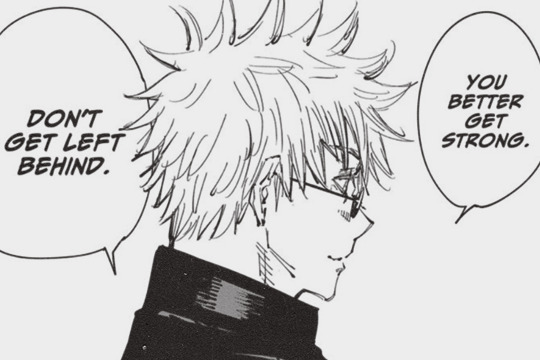
I think Gojo is a product of the same society that raises up kids to be used as tools, and he unintentionally passes that lesson onto his students.Gojo knows that the system is wrong for using kids that way, but he’s such a fundamental part of the system, he doesn’t really know how to overcome it works inside of it instead. I think what he said to Megumi is pretty telling of how he treats these kids in general, he tells him you better get strong or else you’ll get left behind.” He thinks he’s teaching them what’s best, because that’s how Gojo understands the world works, but at the same time he’s telling a five year old kid if he fails to protect his sister it’s all his fault.
Gojo teaches his students to “get stronger, get stronger” as a response for all of their problems. He takes responsibility for their development as sorcerers, but nothing else really, and especially not their well-being as individuals. Gojo basically treats his students like mini-adults, friends he can pal around with, and that makes sense if you think about it, he’s raising them all to be political allies. He’s not really trying to raise a bunch of healthy adults. I think Gojo genuinely does care for these kids and stick out his neck to protect them, and his goal is entirely an altruistic one to prevent the childhoods of other children from getting destroyed like his did. However, Gojo is fatally a selfish person just like Geto is fatally selfless, he doesn’t offer help out of the goodness of his heart, he barters. He always expects something in return from these children.
So, on one level I believe Gojo yes is intentionally using these children. He only extends help when he gets something in return from them, his helps is always conditional on the fact that he’ll gain another ally. However, at the same time I think the problem more lies in the fact that Gojo doesn’t see individual people as individuals, and therefore doesn’t want to pay attention to the indivdual emotions of his students that he ends up using his students this way. He thinks it’s fine. This is how he was used growing up, but this time, Gojo is using them for good ends instead of a bad one.
I think Gojo’s inability to take care of their needs as individuals, especially attending to their emotional needs is why Tokyo Students are so strong indivudally, but weak as a group. Gojo’s only interesting in fostering their strength as sorcerers, not their emotional health, or their interpersonal relationships, because he doesn’t view those things as necessary. I mean he’s only had one best friend his whole life, and look at him, he’s fine.
To give evidence to my argument though, here’s a comparison between the Tokyo Kids and the Kyoto Kids.
1. Tokyo vs Kyoto
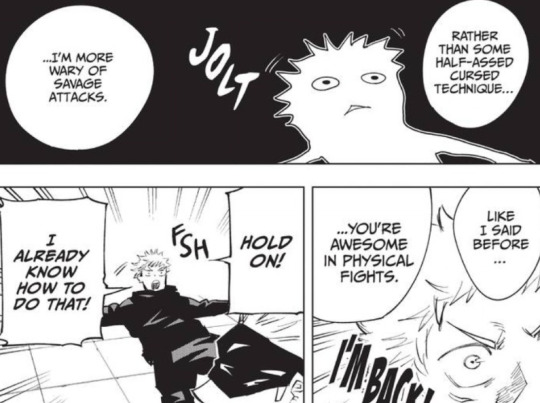
Gojo can be a fantastic teacher when he wants to be, but it requires him paying attention to a student’s individual needs, which he almost never does. When he designs a lesson plan raound Yuji, he does two things that make him better than most Jujutsu Sorcerers already. First, most traditional teachers teach that cursed technique is everything, and would have rejected Yuji outright. Whereas Gojo sees Yuji’s strength as a brawler. He’s willing to go outside the box, and buck tradition to focus on a student’s individual strength and emphasize those rather than telling Yuji he’ll never be a strong sorcerer without strong techniques. The second is he comes up with a method extremely suited to Yuji’s learning style.
However, I think it’s important to note that Yuji and Gojo are actually really similiar. He’s a really receptive student who hangs off of Gojo’s every word. For Gojo it’s like him teaching a younger version of himself, someone who believes that strength is everything, and wants to become the strongeste to be a pillar of support to others. You don’t really get good teacher points for spending the most time with someone who’s easy to teach.

And even with Yuji whose really really receptive to Gojo’s highly individual focused learning style, there are several things that Gojo just neglects to teach or even mention. Basic, fundamental things, that every sorcerer should know.

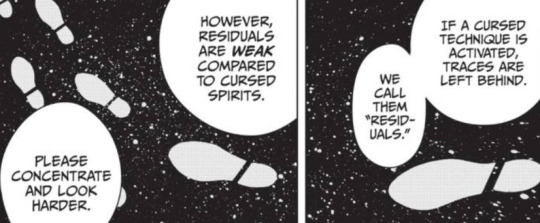
Nanami has to go out of his way to give Yuji the 101, because Gojo neglected to tell him all the basics. Children are smart of course, especially adolescents who are capable of thinking for themselves, but they also generally know what they’ve been taught up to this point. Yuji is a complete newcomer to the sorcerery world, it makes sense he’d basically be a blank slate having to learn all of this from scratch, but Gojo himself either doesn’t know this, or doesn’t bother with it because it’s too troublesome. He thinks of the kids as miniature adults so, it would make sense that he just assumes they know everything he knows already.

That’s the entire point of introducing Nanami into the story. Gojo teaches Yuji to be a better sorcerer, but not to be an adult, and it’s because he doesn’t really see him as a child to begin with. Gojo thinks becoming a strong sorcerer is the way to teach these kids to be good adults, but he neglects the emotional half of having to teach because Gojo doesn’t deal with emotions well. I mean, even in his training of Yuji, he designs a training method where Gojo doesn’t actually have to be there, and present with him most of the time. He can lock him in a room, and go run off to do Gojo things while Yuji teaches himself. As opposed to a mentor like Nanami who constantly watches and monitors his development.
This is where we start to get to the comparison with the Kyoto students. Because even in the creaive way Gojo taught Yuji, there were some things that Yuji just learned wrong, and internalized wrong from Gojo’s lesson.
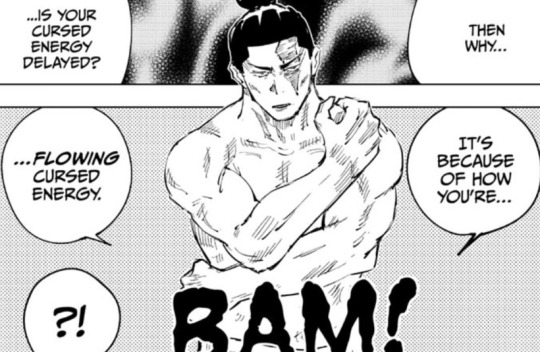
Gojo explained the theory behind Yuji’s divergent fist, but Yuji learned it wrong, because he didn’t understand the way cursed energy flowed through the body. If Gojo was paying attention, he would have caught it and corrected it, but Gojo’s teaching style is sink or swim, let students learn or fall entirely on their own. Whereas, when Todo actually sees Yuji’s flawed divertgent fist, he’s able to point out the problem.
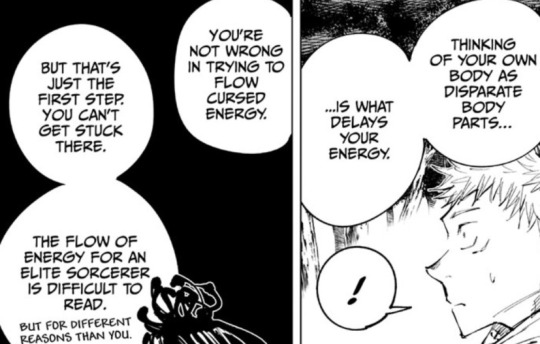
Todo actually acknowledges that there’s a difference between beginners and elite sorcerers, that their’s a learning curve to these things, and rather than leaving Yuji to learn it on his own he guides him through these things. While at the same time, expecting Yuji to figure out some things naturally. Todo never once goes easy on Yuji, I’d say his standards for people are as harsh as Gojo’s. You either learn it or you don’t. You’re either strong or you’re not. However, there’s a distinct difference between Todo and Gojo’s teaching styles, and it’s that Todo is emotionally intelligent, and Gojo is not.
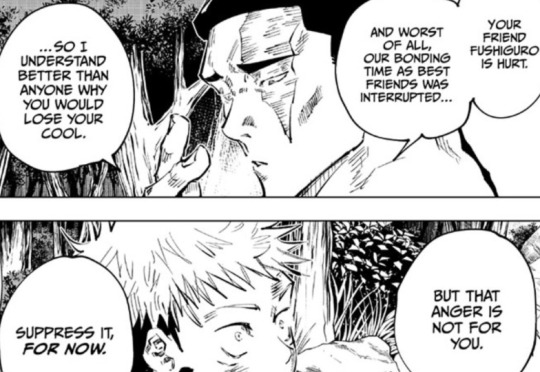
Todo pays attention to people, he notices when they’re off, when they’re going through something, and rather than just ignore it, he almost immediately addresses it and tries to talk them thorugh it. It’s not perfect of course, but having his emotions paid attention to, helps Yuji develop as a person moreso than a sorcerer.
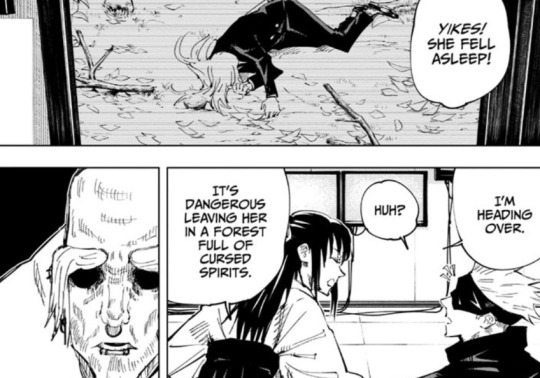
The Kyoto students have a teacher who pays attention to their individual needs. A teacher who actually teaches. While we may not know much about Utahime as a character yet, you can see the direct impact she has on her students compared to Gojo.
Gojo’s students are individually strong, but weak as a team,. Utahime’s students are much weaker individually, but can come together.
It shows both in the Kyoto Battle Event, but also the Shibuya arc. The Kyoto kids are all unstable it’s true, they’re all prone to lashing out, but because they’ve dealt with such dark emotions rather than repressing them they’re also way more capable of talking about their feelings to others.

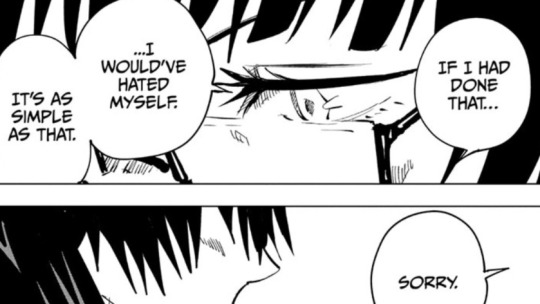
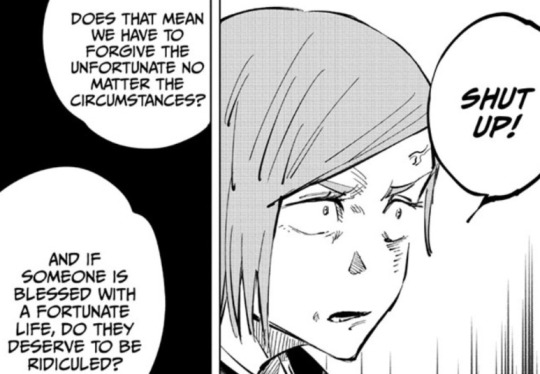
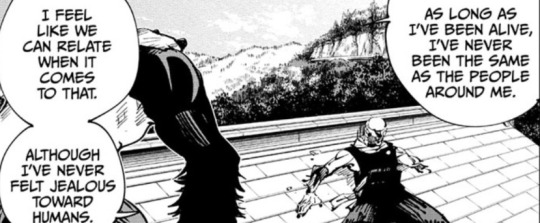

Yes, the Kyoto kids don’t deserve to lash out at whoever they want. Yes, lashing out is a bad way to attempt communication. However, it’s also true that the Tokyo kids respond with what basically amounts to self-righteousness. The Kyoto kids are lashing out because they are going through something, because they’re suffering, yet the Tokyo kids don’t really try to understand those feelings.
Kamo was seperated from his mother at a young age. Maki left Mai behind in an abusive household. Nobara has never experienced the same abuse that Mai has so she’s not really in a position to judge which twin she thinks is the good twin, and which is the bad one. Mechamaru is chronically ill and in constant agony, and then instead of getting him medical help he’s just being used as a toy soldier.
So. The problem is. Gojo’s style of teaching. He wants these kids to be political allies. He wants them to try to make a better world than the one he experienced growing up. However, Gojo doesn’t really teach them to think for themselves. He doesn’t teach them to look at the situation, and the way the Jujutsu World is designed to manipulate and use these children.
Individual responsibiltiy is a good lesson to teach. Individual responssibility can help someone get over themselves and their issues and work towards self improvement, but it’s also, not the only solution. It’s also, impossible to overcome these circumstances all on their own.
Mai can’t be strong like Maki. She’s not weak for folding under the pressure of being in an abusive household. You could even argue that Maki isn’t stronger than her abuse, because emotionally she’s weak, she can’t even maintain a relationship with her own sister she has to cut herself off from everyone.
Kamo has to follow the clan’s orders, he’s terrified they’ll hurt his mother and he’ll never see her again. She’s actively being used as a tool to manipulate them.
Mechamaru is already strong as a sorcerer, that’s not going to stop the fact that he’s chronically ill.
Basically, in this regard Gojo’s students repeat what Gojo himself always says. “Have you tried getting stronger?” We can see why this approach doesn’t work with Kokichi, because he did do what Gojo would always reccomend. He didn’t want to burden others with his emotions so he tried to be strong and solve everything on his own, and that resulted in his death.

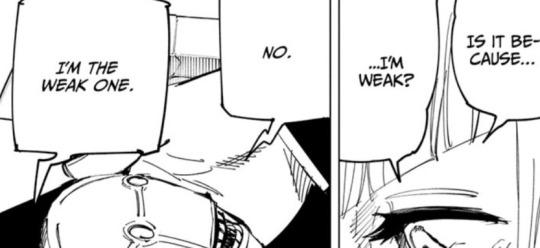
Think if Mechamaru had been supported. If he thought it was okay to confide his problems with others, if it was okay for him to be weak, and ask for help when he didn’t know what to do on his own.
However, when he tried to do that with panda he just got slapped with a “Your behavior is wrong.” It’s why even when telling people, especially children their behavior is wrong you also need to be sure to take care of their emotional needs as well. Especially teenagers, because teenagers are literally all emotions, they’re not minitature, fully-developed adults. Kokichi was wrong to lash out, but his emotions were right. He has every right to be in pain. When he’s told off, he also takes that as a message that he’s weak for trying to confide anything in others, that him complaining about his victimhood made him weak in the first place, so what does Kokichi do. He retreates into himself, he quiets down about his problems, he tries to solve everything on his own and he fails at doing that because you can’t. You cannot solve all your problems by simply being stronger than them.
Gojo’s students aren’t raised as emotionally healthy individuals, and because of that they also can’t really relate to the emotions of other people, especially the negative one. They are, strong willed individuals yes, strong sorcerers, yes, but they’re not really a team.
I think that’s illustrated in how they all fall apart in Shibuya. All of Gojo’s students basically make the same mistake, they don’t listen to the adults, they charge into battle because “I’m strong enough.”
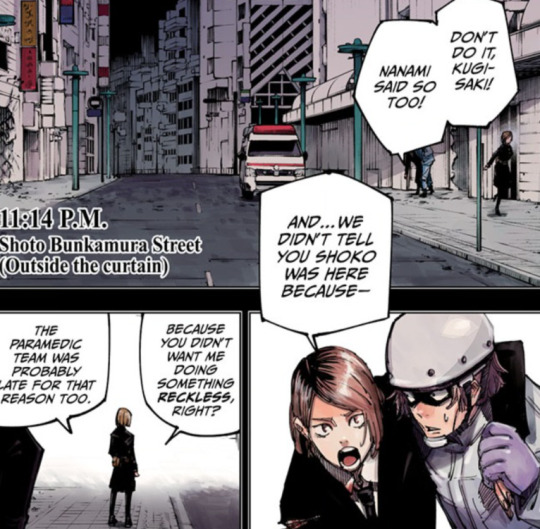
Nobara, the adults literally all told you not to fight. Nobara: Nah it’s fine I’m strong.
Look at how Nobara loses. The second she starts fighting with Yuji as a team, she makes a sloppy mistake because she 1) underestimated her opponent and 2) was never taught how to fight in a team.
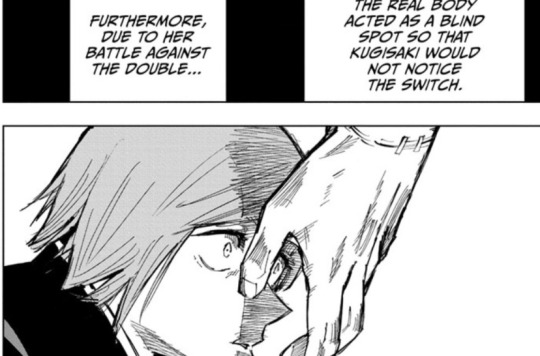
It’s not just Nobara though it’s every single one of them.
Yuji runs off on his own, fights on his own, and loses to Choso. Megumi suicide attacks to take down one (1) opponent whose just a regular curse user when he reaches his limit.
This is what they are all taught. They all have to fight on their own, be strong on their own, and if they’re strong enough they’ll win, if they’re not strong enough oh well. The Tokyo Kids genuinely like each other as a team but they’re always running away from each other. They all overestimate themselves and what they’re capable of handling and get in over their heads.
And it does go back to the Kyoto Battle arc, because the Tokyo kids are just as emotionally disturbed as the Kyoto kids, they just are repressed about it. Take Megumi for example, Megumi has been abandoned and neglected all of his life, and Gojo never really offered him any support or healing for that abandonment.
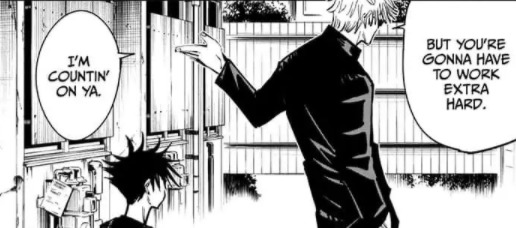
There’s no canon indication that Gojo ever raised Megumi or did anything with him other than provide for housing, and protect him from the Zenin clan on the condition that Megumi STILL BECOME A SORCERER, JUST ONE POLITICALLY ALLIGNED FOR HIM AND NOT THE ZENIN.
He didn’t offer Megumi a chance at a normal life, or even help him grow up as an individual because Gojo’s not interested in these things. Gojo’s help is conditional on the fact that Megumi work hard to pay him back, and reach his full potential as a sorcerer. As a result, Megumi is walking around with completely unaddressed abandonment issues as a result of never having a stable adult in his life, and this goes, completely unnoticed, which leads to him constantly risking his own life, endangering and harming himself. Megumi’s just as unstable as the Kyoto kids, he’s going to do something dangerous someday soon. It’s just Megumi’s been taught from a young age, he has to be the responsible one in his household, and he has to take responsibility for everything on his own by working to become stronger, and look like where that has led him.
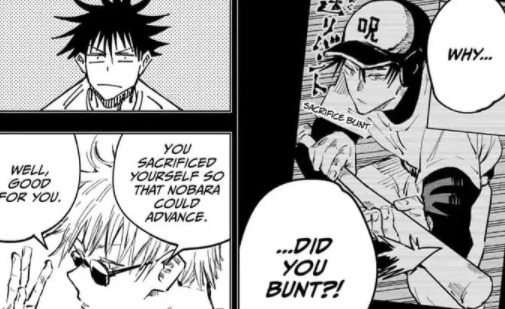
Hmm, I wonder why Megumi always feels like it’s his responsibility to sacrifice, what could have possibly led him ot that conclusion? Why does he feel so responsible for the actions of other people around him? It’s a geuine mystery.
However, the Kyoto kids are capable of doing something the Tokyo kids can’t do. They can cry and be weak in front of other people. They can support each other as a group. Not only did they help Miwa at her lowest point, but Yuji would have given up, had Todo not shown up when he did.
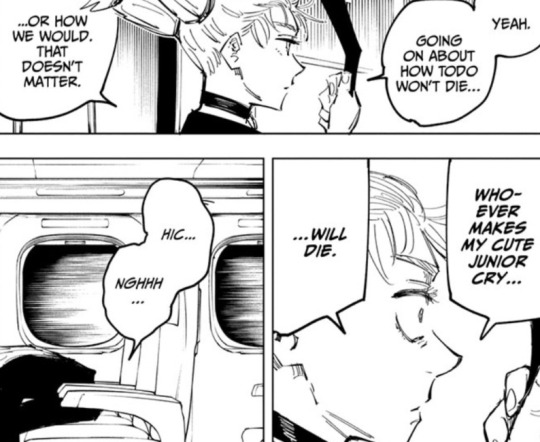

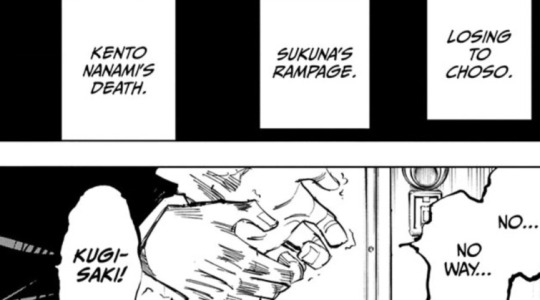
Yuji actually wasn’t capable of handling it all on his own. He couldn’t defeat Mahito just by being stronger than him, or having a strong will.
Individualism like Gojo teaches is important, but it’s also incomplete. It’s only half the solution. The Tokyo kids need the camraderie of the Kyoto kids, the same way the Kyoto kids need to learn to take responsibility for themselves.
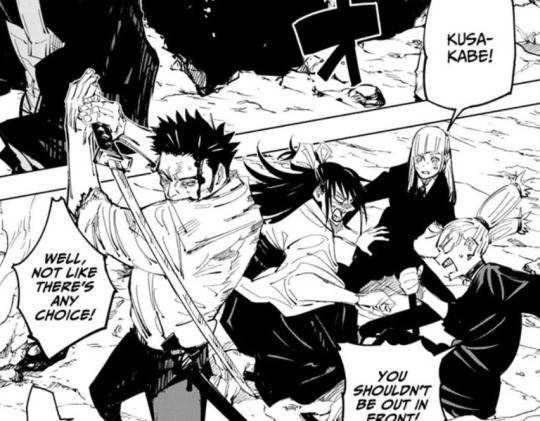
That’s why the Shibuya arc ends the way it does. The Tokyo kids failing as individuals, and the Kyoto kids coming together as team. However, since both sides only have half the answer, neither side is able to defeat Kamo Sr. totally.
However, Gojo’s mistakes are shown even more clearly after the arc resolves. Gojo doesn’t actually teach people to think for themselves, because he’s raising them up to follow his politics. Now, look at what his students are doing in his absence. Gojo wants to fix the broken world, but Yuji’s conclusion he comes too after suffering is that he doesn’t want to think about fixing the world. He just wants to become another cog in the machine.
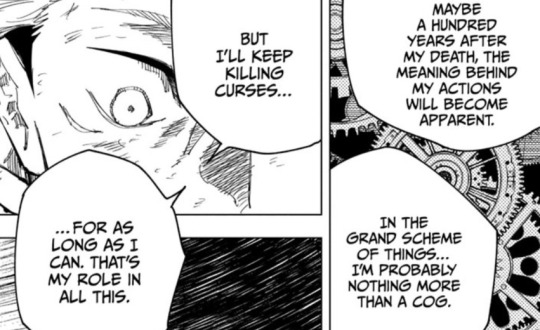
What was the greatest mistake the previous generation made?
Geto. Not only in exposing him to the trauma of Riko dying in front of him. But also, offering him no support a year afterwards. Yaga completely neglecting him and failing to see what was going wrong. Then, when Geto finally did break, sending another student to kill him.
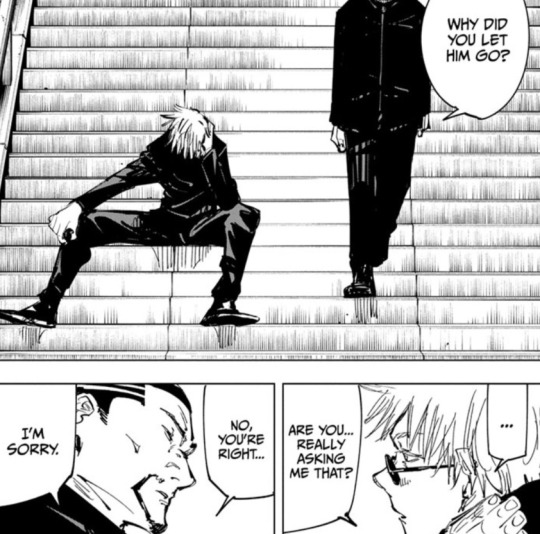
Yaga really can’t understand why this eighteen year old would hestiate to kill this other eighteen year old, that’s been his best and only friend for three years. Why is this child not comfortable with an execution mission? It baffles the mind.
Gojo, by failing to raise his students as emotionally healthy individuals repeats the same mistake.
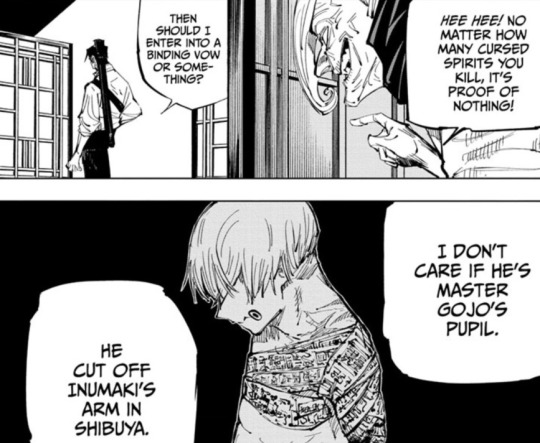
Yuta and Yuji both don’t really care about the world around them, or politics. They don’t pay attention to those things, they weren’t raised to do that. However, now because of that, because both are willing to become cogs in the machine they’re both letting themselves beused right now.
They refused to think for themselves, so now the elders are manipulating them into a conflict against each other. Yuta because he doesn’t see the situation at large, he only wants to protect his friends. Yuji, because the only way he thinks he has value is by killing curses, he’s just going to keep blindly executing them until Yuta comes to kill him. Gojo’s students are divided specially because of that reason. They’re not together as a group, they’re just a group of particularly strong individuals, and Gojo never even thought that these strong individuals with no particular connection to each other might turn against each other. They might lie to each other. They might keep secrets from each other. They might fail to communicate. Because, Gojo doesn’t really pay attention to complex relaitonships like that. He’s only had his one friend his whole life.
Even though that’s also exactly what happened to his one and only friend, his emotional needs were neglected by the system around him until he completely fell apart. Geto and Gojo’s problem wasn’t that they weren’t “the strongest” when they were together. It’s that they were never “together” again after a certain point.
352 notes
·
View notes
Text
Disruptions of Ritual and Inciting Incidents
I’ve been lucky enough to be a part of a creative development series lately which has come with a lot of great advice and guidance on storytelling, from the extremely specific to the really broad and sweeping. It’s covered everything from character motivations to specific genre structures to audience expectation to interpersonal conflict, but one of the things that has come up over and over again has been the idea of disruption of ritual as pivotal to the establishment of a story.
It’s been interesting to hear it articulated this way, because when I’ve taught creative writing in the past, and when I’ve thought about my own writing, I’ve always talked about this concept as the world we leave behind. It’s the pre-inciting incident stuff – the introductory grounding stuff – whether that be Harry’s life before Hogwarts, or the Bennet’s home before Mr. Bingley moves in next door.
You establish a world – or a ritual – and then you break it open.
It’s in the schism, in the disruption, where your story finds it’s legs and starts to move.
It’s had me thinking a lot about the relationship between the disruption of ritual and the inciting incident of a story, because in a lot of ways, that disruption of ritual directly sets up the latter. A story like Bridgerton has the disruption of ritual in Phoebe making her debut – a change for the whole family – but the inciting incident is really her collision with Simon Hastings and their mutual decision to fake a courtship. Similarly (but differently), Harry Potter has the disruption of ritual when the owls start descending on the Dursley home in the lead up to Harry’s birthday, but the true inciting incident is when Hagrid tells Harry he’s a wizard. Neither of these inciting incidents could’ve happened without the disruption to the character’s lives that got us there.
When we talk about inciting incidents, we’re ultimately talking about the point of no return for your protagonist. Where they either make a choice, or have a choice thrust upon them, it’s one they can never go back from.
How the disruption of ritual lays the groundwork for the inciting incident though is important. It’s not just creating the first bubbles of conflict to pop, but it’s a key part of establishing who your character is and what world they exist in.
But what does that look like? Generally speaking, I find it’s useful to think of this sort of pre-inciting incident (or disruption of ritual world) in three categories:
Change of Circumstance
Change of Environment
Change of Information
So let’s break that down a little!
Change of Circumstance
I think this one is probably the most common.
I’ve watched a lot of new movies lately and I think change of circumstance is at the heart of all of them – in Nomadland, Fern’s husband has passed away and she’s had to move into a caravan out of financial necessity; in The Father, Anthony’s daughter is moving to Italy and so she tells him he’s being moved into an aged care facility for his dementia; in Those Who Wish Me Dead, Hannah, a firefighter, has been benched after freezing during a fire which lead to the death of two teenage boys.
While all these changes are environmental too (which I’ll come back to in a second), they’re more punctuated by the impact these circumstances have on these characters – Fern is grieving, Anthony is losing his agency and independence, Hannah’s role in a job she loves has been diminished.
These changes to circumstance create the context for which the inciting incidents begin and ground the characters within their own emotional arcs. The inciting incident in Those Who Wish Me Dead is when Hannah finds another teenage boy in the woods who’s being chased by assassins; in The Father, the inciting incident comes when Anthony’s daughter hires a new nurse that reminds him of his other, dead daughter, in Nomadland, Fern connects with a seasonal worker at an Amazon factory who in turn connects her to the nomad lifestyle.
In this sense, the disruption of ritual starts a conversation that the inciting incident can either build off or interrupt or both. The examples above are all pretty big, but these sorts of circumstantial disruptions can be anything. They can be as simple as a promotion at work, a pregnancy, a new neighbour; or hell, you can go the other way, and get even bigger – start a war, go on the run, discover a new planet! What’s important though is that initial change of circumstance creates context for your protagonist and builds towards your inciting incident.
Change of Environment
This one is still pretty common, but I’d say it’s often used most efficiently and effectively in horror and fantasy.
Moving house or exploring new territory, whether that be campsites or cave dives or new planets or planes, is a natural way of putting your characters off-kilter and building environmental tension. This tension is really steeped in the unknown of the space your protagonist is interacting with, and in the promise of conflict within it. Movies like The Descent, Hush, Lord of the Rings and Star Wars are all fundamentally steeped in their opening acts involving drastic shifts to their environments that build conflict, whether that be because an environment becomes something to protect (Hobbiton in Lord of the Rings), or something that the protagonist needs to be protected from (The Descent), or that environment being invaded (Hush) are all factors that are essential to the story overall.
In these stories, these environments aren’t just a stage for the character to move across, they’re deeply interactive and often allegorical to the character’s circumstances.
My Neighbor Totoro is one of my favourite examples of this – Satsuki and Mei’s move to a new home whisks them into a magical world with soot spirits and forest creatures, but these spirits and creatures are an escape from the reality that they moved because their mother is sick in a hospital nearby. The environment they’ve moved to is them clinging to a child’s world as they live ever closer to their trauma.
The most important thing to think about with environmental change is to ask why? Environmental change isn’t about simply presenting a stage for your characters – all stories have that – but that that environment be a motivator in your character’s overall arc. After all, Nomadland might deeply love the American landscape, but Fern’s story is driven by circumstance, not environment, as I mentioned above.
Change of Information
Probably the least used of these three, an information disruption is often reserved for stories about whistleblowers or journalists. Spotlight, Bombshell, All the President’s Men, hell, even The Bourne Identity all rely on a transfer of knowledge as pivotal to creating the conflict that the story builds on.
Change of Information involves a character learning something that they didn’t know before, and the information could seem incidental in the first act (the journalist in Citizen Kane for instance learning that Kane’s final word was ‘rosebud’, or Adrian Toomes realizing there’s alien tech in what he’s been assigned to clean up in Spiderman: Homecoming), or it could be left as a landmine for our protagonists to discover (Spotlight did this by opening with the cops in the 1970s talking about the child molestation charge that our protagonists would start investigating in 2001), or be the overall driver for the film (Min-hyuk telling Ki-woo about the Park family in Parasite).
I think Change of Information set-ups though can also be broadened out to tie pretty closely with Change of Circumstances set-ups to the point that I actually almost considered condensing the two, but I do think they’re different enough to be untangled. Parasite of course straddles all three in its brilliance as the information Min-hyuk gives Ki-woo of the Park family creates both a change in circumstance and environment too, and Midsommar is a movie I’d consider to be all three too – knowledge changing hands is essential to that film overall, and the focus in the first act of Dani finding out that her sister’s commit suicide is pivotal to everything that follows. Her change of circumstances and environment hinges on her grieving her sister, yes, but the weight of the opening act is on the discovery of that more so than it is on Dani’s circumstances changing. Life goes on is, in many ways, pivotal to that first act.
Change of information, to me, is about a character’s awareness of something creating that initial disruption overall, and that new knowledge being the ultimate plot and character driver for the rest of the story. It’s the new knowledge or awareness that creates story mobility, environment and circumstance can just come along with it.
What are you talking about, Sophie?
Right, sorry, haha.
Disruption of ritual is ultimately the shift in the story that allows for the inciting incident to happen. It’s what creates the perfect storm of circumstance, environment and information which fuels your characters, but what you choose to prioritise and emphasise is going to impact the direction of your story and provide your readers or audience with the context that shapes their experience overall.
What drives your characters is what determines their path throughout the story you’re telling, and considering circumstances, environment, and the information they do or don’t possess is an important part of shaping that. You don’t have to pick one, of course – as I mentioned above, a lot of great stories embrace two or all three! – but thinking about each and asking yourself why and working out what’s the priority for your protagonist might just help you articulate the crux of your story and give you an opening act that resonates.
139 notes
·
View notes
Text
3 NPC Models and How to Use Them
Many people have observed the differences between Actual Play DMs’ play-styles, and while there is endless room for variance here, we’re going to talk about the 3 main models of NPC use, and we’re going to do that by talking about attitudes. [full disclosure: this post was inspired by this post about NPCs and DMing in Critical Role, if you’re interested!]
In D&D 5e, there’s a concept that in an ordinary social encounter, PCs who want things from NPCs will try to convince them of their lies or get them to do something. To run these encounters, the DMG has provided a basic system to help DMs figure out how NPCs will react. Friendly NPCs will usually do what’s asked of them (the DC is fairly low), while Hostile NPCs take more effort to convince and Indifferent NPCs are somewhere in the middle--they’ll accept a request provided there’s no risk involved, for instance.
But this model of NPC interaction goes astray when your PCs have more complicated relationships with the NPCs. It’s easy enough to apply this system to an innkeeper or an old man whose goats you just killed. When you are engaging with, say, a Rival you met a few levels ago, that system starts to get confusing. The Rival isn’t indifferent, but they’re not exactly hostile, either. And what about when an NPC has a specific goal in mind?
All this gets complicated quickly, so we’re going to sort it out with 3 models of NPC use.
FIRST: The “NPC Typecast” Model. In this model, NPCs fall into certain typecast roles. Any friendly NPC will defer to the party’s desires and plans. They aren’t coming up with ideas of their own. An indifferent NPC is usually interacting with the party in a mercenary fashion--there’s an exchange necessary to get what you want (such as a shopkeeper or a spy who might turn on her employer). And a hostile NPC is usually a villainous character, with goals that work directly against the party’s goals. Rare is the occasion that they will work alongside the party--and if they do, expect them to be plotting a double-cross. This system is ideal for a straightforward campaign where most threats are External or Epic in nature, or where the lines of Good and Evil are pretty clear. Usually, the party will be Good-Aligned overall, and the friendly/indifferent/hostile dynamic corresponds to good/neutral/evil. This model is great for letting the party have agency--these NPCs are pretty much never going to tell the party what to do or have a secret agenda, unless they’re Evil. For an example of this, look at Critical Role, where DM Matt Mercer’s friendly NPCs tend to defer to the party members and typically have no interpersonal conflicts even as hostile NPCs might feign friendship to get what they want.
SECOND: The “NPCs Have Agendas” Model. When you’re running a campaign that is more roleplay-dependent, such as a mystery or political intrigue game, you’ll quickly find that the NPC Typecast model doesn’t meet your needs--it’s simple, but you are running a complicated game, and that calls for complicated NPCs. In these types of games, NPCs are going to have agendas that don’t align with the party. That doesn’t meant they aren’t friendly; it just means the NPCs have their own goals in mind. Under this model, friendly NPCs are more likely to compromise their own goals to help the party, while indifferent NPCs prefer a quid pro quo--if they help you, you must help them. Hostile NPCs, then, need more leverage or convincing--for example, you might need to blackmail them to get the job done. This is the type of campaign I run. Now, not all my NPCs are super complex, but the important ones usually have goals and ideas that don’t revolve around the party. The more morally complicated your campaign is, the more likely you’ll fall into this model: Because each NPC has personal wants and fears, it’s easier to portray them as fallible, as vulnerable to temptations and flexible with their morals.
THIRD: The “NPCs Are People Too” Model. In this system, NPCs act like, well, like people. They also have goals, wants, fears, etc., but the key difference is that in this model, the campaign itself tends to be extremely roleplay-heavy, if not entirely roleplay. There’s conflict, but it’s mainly interpersonal or inter-factional. NPCs each have feelings and reasons behind why they do what they do, and in this model, a savvy PC can capitalize on that and befriend someone who might have started out hostile. You might still use Good and Evil as factors, but in such a model, they’re mostly names for sides and priorities, not the definitive alignment system that’s often assumed in D&D. These campaigns sometimes even push into slice-of-life, but not always--they might be better described as Pacifist Campaigns. This model, in essence, assumes that most creatures that understand language can be reasoned with--and most of the time, the players will choose that route.
While none of these are bad models to use, issues can arise if there is a mismatch between what the DM is running and what the players want to see. If the players want to be in the third model, and the DM is going for the first, either the DM will be annoyed that no one is fighting the monsters or the party will become frustrated that every encounter ends in a fight. In fact, specific players who gravitate to a particular model of NPC might not enjoy the game as much if the rest of the group prefers a different version.
Issues can especially arise if, as a group, you have decided to play a game with a particular approach to morality. If everyone is strictly Good-aligned, having a series of complex moral encounters with NPCs that have agendas can leave the party feeling impotent. They can’t trust anyone, and difficult moral choices are just not what the group is looking for from this game. In the opposite direction, say you are running a morally complex campaign but your friendly NPCs are not as morally complex as your hostile ones. You might be hoping to avoid railroading by having NPCs making the decision, but if your NPCs are too forgiving of a morally gray party and don’t have personal wants, it will start to fray the suspension of disbelief--your friendly NPCs won’t feel as real and developed in comparison to your hostile ones, and the end result may be that your players don’t want to interact with their own allies. Players can sense an underdeveloped NPC as much as they can an overdeveloped one--and they tend to gravitate toward developed NPCs because that’s where interesting encounters tend to happen.
Of course, you might find you’re using a blend of different approaches in your own game, or even moving from one model to another depending on the current arc. In my own game, I usually use a blend of model 1 and 2. Because we’re in a strongly roleplay-focused arc with very complex characters, I’ve shifted to do mostly model 2 with some model 3 qualities! That’s perfectly fine, and as long as it doesn’t force NPCs to act inconsistently, using different models in the same game isn’t a problem either.
184 notes
·
View notes
Note
What would you say is the very core of dirkjake? I struggle to put it into words beyond dirk being afraid jake will get tired of him
Ok this is a fun one hang on, strap in,
Much like vrisrezi, and in fact a reoccurring theme throughout HS as a work in full -represented in varying levels of relevance to its cast of core characters- dirkjake is about the masks we willingly fashion ourselves after to starve off insecurity. Everything else is a permutation of that.
But also akin to vrisrezi, their interpersonal relationships and character arcs are heavily about how said performances can be turned into destructive weapons that hinder the development of one's growth and personal identity, rippling through friend groups and plot events. That's a lot of words. So let's break it down like this:
Vriska's Mindfang performance is a defense mechanism created to strengthen her resolve when dealing with isolation and an abysmal monster as a mother, and serves to advance the plot, but is highly harmful to vriska and those around her. (Of note - Vriska doesn't see herself as a villain, it is incredibly important that she's a HERO, just a highly polarizing and problematic one.)
Terezi's Legislacerator ((space cop)) performance is an elaborate persona created to make sense of an antagonistic and temperamental environment, and seemingly dole out punishments that would ensure things continue to function as they should, even to terezi's personal detriment. Vriska is far from the first troll or human terezi has killed, but it's the one that breaks the scale, because terezi knows she's just another victim of the system.
Neither of the above make up the entirety of vriska OR terezi as characters, simply the masks they've chosen to slot themselves into a narrative that will not stop for them, or anybody else for that matter, to have time to 'figure themselves out' before steamrolling them. Vriska and terezi's relationship relies in the bond they formed through the cracks on their masks, to a point in which hopefully they can help eachother to get rid of them.
When talking about dirkjake, instead of focusing on the alternian or human society we have the introduction of dystopic hyper isolated homescenarios that will define their viewpoints as Characters in this story. If vrisrezi is cops-and-robbers, dirkjake is princesses and dragons. Oh yeah, they're both simplistic morality plays.
It is precisely how set apart they are from everyone else but immediate danger (may it be rogue lusii naturae or imperial drones) that molds them into people who crave connection but are too cocooned inside their own walls to let anybody through, even those they care for. Taking the brunt of responsibility for a Legacy and attaining a greater future plays a key role for most of the alphas, but in dirk and jake's case this is demonstrated through the necessity for brash, masculine heroism and the suppression of fragility or sentimentality. Before the story has a chance to admonish them for stepping out of line, they'll do it to themselves out of habit.
The situation gets a little worse when the roles they've picked to enact (invariably, The Hero!) don't match with the roles the story wants them to play.
Jake is the archetypal swooning and good for nothing princess who's there to look pretty and provide motivation To others, modernized into the cool action girl trope we've known to find and despise in every other movie, those who often say 4 lines about how cool and smart they are or how they were raised by their older brothers with big guns and then spend the rest of their screentime in varying states of distress, undress, or concerning unconsciousness. Sometimes all three!!!!!
It is because of this lack of agency that jake stresses his role as a charming gallivanting and STUPID action hero, thereby providing a excuse for his lack of control over his own life, and makes stumbling into situations ass-first look charming. He wants his friends to be impressed with him, and he'll lie to achieve that effect, because he wants to be liked and to be taken seriously. The problem is that he's all too aware of how he's been set up, and he vehemently rejects it.
Dirk is the dragon. Yup. Function? To be slayed. Duty? To make your life a nightmare in just about every possible way, giving the eventual story payoff a grander climax. Inadvertently, accidentally, well-intentionally, and yet sometimes on purpose, dirk strider ends up in the antagonist role. His awareness of the fact and penance for its weight is such he'll preemptively take the blame for things that aren't even his fault, like a loser. While jake eventually has to deal with how he ends up breaking things on accident to provide a backdrop motivation for others, dirk is stuck in a self-fulfilling loop of having mostly negative input in everyone's lives, including (if not specially) his own.
Dirk's hyper-investment in playing the Knight, like his brother before him, and ensuring his input on everyone's stories remains constructive and ever-helpful even if he doesn't know what the FUCK he's talking about or what is happening 99,9% of the time is a byproduct of multiple timelines spent in less glorious ways.
The core of dirkjake, then, is how they're simultaneously the one person who's the closest to seeing the other for what they truly are, but ashamed of their own shortcomings, they do their best to advance the fantasy version instead. To know and value a loved one is to become aware of your own lies, and to acknowledge the performance panic that comes with it. Ye olde jingle of "Self-recognition through the eyes of the other" and "the pants-soiling fear that actually you're still a faker and you will never be enough", weaved up and remixed. Their problem is that Princesses don't marry Dragons, and in a realistic setting neither do Princes and Knights for that matter, they're too busy with- doing the other stuff!!!!! The stuff that should be done! Even if they wanted to!
Which actually goes right back to my claim that dirkjake is exactly like Shrek, The Movie, And This Is Why.
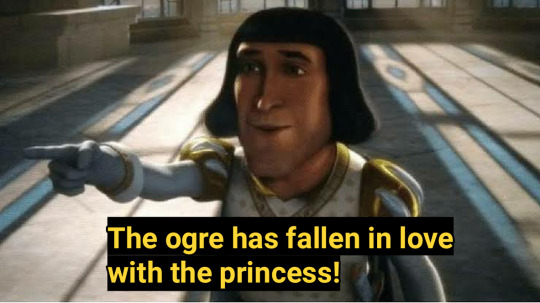
460 notes
·
View notes
Text
Women and Interpersonal Relationships: Beyblade and Yugioh Arc V
So uhh… I have seen the recent critiques of female characters in beyblade, the metatextual ones and the ones trying to justify their characterization within universe. Hell, i think I've been a part of that, only i did my critique in narrative form. In the end though, while there are some nuances to each critiqued character, I’ve never felt the need to fully break down each aspect of their characters and try to identify the good and bad, and I probably wouldn’t do that good a job of it, as I do tend to miss and forget character details sometimes.
However, there is one aspect of the women of beyblade that I dont think I've seen brought up yet (if someone has please send me the post i love reading them). That is their interpersonal relationships.
Or to be more specific, the lack of them.
So, today I will be discussing how dynamic interpersonal relationships play an important role in game anime and how it relates to female characters. And I’ll warn you now, I will be comparing beyblade unfavorably to yugioh arc v. I hope the writers of beyblade are ashamed that I’m actually able to do that, it should be impossible.
First off, lets look at some of the other base relationship types that are often in game anime, and specifically beyblade.
There are rivals. This is a hallmark of the genre, as it is of many others. This normally consists of two homoerotically charged men repressing their feelings by saying they’d rather want to beat the other up. Its the most common and dynamic relationship in many of these shows, and serves to allow either character of the rivalry to develop, while also lending them importance in the other character’s arc and plot. Some examples of this in beyblade would be Gingka with Kyoya or Ryuga, Masamune with Zeo or Chao Xin, etc. Beyblade, unlike some other shows, actually does not normally have long running rivalries, with the exemption of Gingka. It does have a spade of short-lived rivalries though.
There are partners and teams. These are characters that work together to make one another better, whether for a short or long period of time. Whats most important about a good partner pair is that they should develop the characters. So no Sophie and Wales do not count, name one lick of character development they had and I will give you that point. Actually, I think Tsubasa and Yu are the ones in this category.
There are also friends, mentors, kids to protect, etc.
But the most important part of these relationships is that their supposed to push both characters through their arcs. Characters should impact each other and change through interaction with others. They should both be focused on at some level.
By creating relationships like this, giving them history and weight and letting characters challenge and change each other through them, it brings importance to both of them and invests the audience in them. But more importantly, it brings importance to their *battles*
That’s the thing about game anime, right? It often is just a series of battles, normally tournament arcs, where characters are paired or teamed up, and its those existing relationships or rivalries that drive investment in watching the clash.
So now that I’ve set that up, lets discuss how beyblade utterly disappoints its female characters.
So. Madoka. Oh god, Madoka. First, to be clear, Madoka is already hampered in terms of the relationships shes allowed to form and their impact because, of course, she isn’t allowed to battle! With that, her relationships utterly lose all meaning on her end, because why should she have to change or challenge someone? Shes not battling! She isnt participating in the framing device!
Madoka has the blandest relationships with the cast. Like, sure she has them, and theyre consistent. But what can you say about them, really? She kinda seems to be annoyed at Kyoya a lot? She doesnt like it when they get into trouble? She supports them? In the end, her relationships rarely change or undergo any development. She begins by being supportive, ends by being supportive, doesn’t change at all and changes nobody else. This takes away any options for importance from her, and makes her a nonentity.
Hikaru, on the other hand, has some relationships! She has some! Clap! The beyblade writers have fed us crumbs! She technically has three rivals, Gingka, Kyoya and Kenta. Lets go through them. She battles Gingka once and he makes her realize she needs to enjoy battling or something, they continue being rivals but never get another one on one battle. How helpful. Truly, a good rivalry. They barely change each other, and theres no buildup to either improving or facing the other again. She does change Kenta a lot tho, winning against him in her introductory episode before quickly losing to him in the next. And then they never battle again. And then theres Kyoya! What can you say about the two? Well, they respect each other, they get two battles, but they don’t seem to change the other.
I had to look up Hikaru’s wiki page to check all this information. I cannot remember what happens in any of her battles except Kenta. They were unimportant. If I cannot remember them, then what impact did they really have? None. While Hikaru is allowed more relationships, in the end none of them are that well done, and all are weak.
I could list the other female characters, but I think you already know they had none. Sophie has Wales. They work well together. What else can I say about them? They challenge the main cast, I suppose (their teamwork encourages gan gan galaxy to work as a team). Mei-Mei also challenges the main cast, too bad she never gets a solo battle against any of them! Lera. Lera I’m so sorry.
Now, you may be asking, why is this important? Why do these relationships matter? How do they impact the viewer?
So now, we get to talk about Yuzu from Yugioh Arc V (only season 1 though I havent seen the rest). And how the depth of her relationships destroys Beyblade immediately.
Yuzu is the leading female character, like Madoka, but she’s actually allowed to fight (did beyblade know you could do that?) so I’ll be comparing her to both of their strengths. Trust me, it won’t put her at a disadvantage.
Yuzu’s first duel is her beating our male lead. Yes, that’s right, she beat the male main character in her first duel. Now, this is mostly to show how far he has to go, so it impacts his character more than hers, but it immediately lends credence to the fact she is a strong member of the cast and can be a threat. Rather than saying she can be a threat, they let her show it.
Now, she never rebattles Yuya (our male main character) in season 1, or as far as I remember, but that doesn’t mean their relationship stops developing. Yuzu’s arc in the first season is about her learning to believe in herself and her own abilities, gaining self-confidence. And to do so, she also has to learn to put confidence in Yuya. She regularly questions herself on who Yuya is, and if she thinks he’s capable of causing harm. Those fears feed in to her self-doubt, and deepen the relationship between them by adding depth to it. Not only are they friends, but they are friends who are growing and changing and trying to discover themselves together. In fact, this relationship is allowed to characterize Yuzu even more than Yuya, with her confidence issues. Her arc is therefore granted importance through its relation to him, and it allows for the tension of her arc to appear in character scenes between the two.
Madoka is never given this level of depth with Gingka, his failures or flaws never impact her character or lead to her own personal growth.
Though Yuya isn’t her rival, that doesn’t mean Yuzu doesn’t challenge anyone. In fact, Yuzu is so important that the show gives her a rival to call her own (and have homoromantic tension with, the girls can do it too). Julia is created specifically to rival Yuzu, she is not some transferred rival from a male character, she is Yuzu’s Rival, as much as Kyoya is Gingka’s. In episode 10, Yuzu and Julia have their first duel, which Yuzu spectacularly loses due to her self-confidence issues. Julia effectively calls out all the ways Yuzu is lying to herself and challenges her on a personal level. Yuzu is allowed a depth of character that allows for personal insults that expose her flaws and how she needs to improve! This duel not only sets up a rivalry between the two, but demonstrates how Yuzu will have to grow over the season.
Tell me, did Hikaru and Kyoya have such a set-up in their duel?
After losing to Julia, Yuzu proceeds to ask another character, Sora, to teach her fusion summoning. She distances herself from the rest of the cast as she learns to be stronger, now interacting with Sora a lot as he tries to teach her. While their relationship isn’t focused on, its referenced a lot, and you can see that their comfortable with each other. Other characters will even reference their relationship. Yuzu’s loss to Julia changes her relationship with the entire cast, her relationships are allowed to develop and thereby bring importance to their duel. That duel genuinely *changed* her.
And not only that, Julia will continuously show up and run into Yuzu for the next few episodes for plot reasons, and the tension between them will grow as you wonder if Yuzu will get strong enough to beat her.
Then, at episode 29, Yuzu and Julia finally have a rematch. In this duel, Yuzu is much more confident, powerful, and has to think on her feet and act to beat Julia. She successfully performs her first fusion summon to beat Julia, the person who inspired her to get stronger. She wins the duel, and all that tension that built up from her loss, the constant run ins, and her character growth is given resolution and meaning when she beats her.
Yuzu isnt well-written, but her relationships are dynamic and allowed to change, thereby giving her credence in the plot, in other characters, and in battle.
I don’t sense that same tension and resolution from watching Hikaru and Kyoya’s second battle. In fact, I can barely remember it. Did it change Hikaru? Did it change Kyoya?
Without relationships, characters are only allowed so much importance, especially in a show where tension between characters drives investment in the battles. Hikaru and Madoka arent really allowed to build up relationships, to change other people and change because of them in significant ways, or have battles that the viewer can become invested in because of long-running relationships.
Because of this, they will never be fully-formed and dynamic characters within the cast, they’ll just be a support character that fills up time and can spout explanations, and death fodder.
I feel slightly bad because i do think beyblade in general could do better with long running rivalries among its supporting cast, but i think the girls in specific are shortchanged, and yknow, this isnt a unique problem. If you have any counterpoints or additions to this id love to hear them, and mostly i hope i added something interesting to the discussion.
#beyblade#beyblade metal fight#yugioh arc v#hello yes heres my essay on The Girls#can you tell im not an essay writer#ive just been having Some Thoughts and wanted to get them out there#uhhhhhh kinda anxious about posting this modtly because i worry that ive forgotten a really good relationship in beyblade#but if i did forget then i can only be pleasantly surprised#also dont worry yuzu isnt a well written character either shes a Yugioh Girl the standards are so low#i just recently got to watch the first season and so have been on a yugioh kick#id compare it to zexal but zexals girls are............. you know what i dont think theres a word for how lacking they are#i really love beyblade just damn i wish the girls were better written#was this an excuse to talk about how yuzu and julia own my soul now? yeah probably#my end point is uhhhhhh give girls rivalries
18 notes
·
View notes